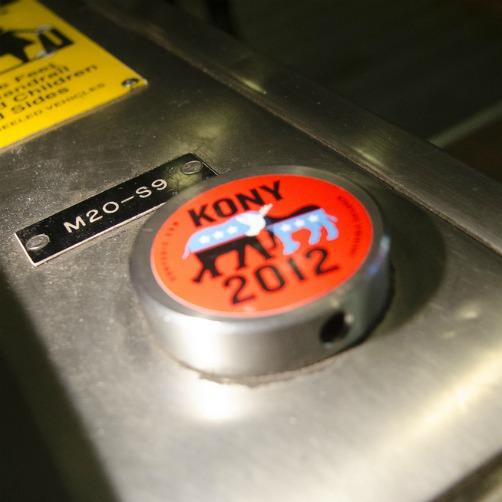BOB GARFIELD: From WNYC in New York, this is On the Media. I’m Bob Garfield.
BROOKE GLADSTONE: And I’m Brooke Gladstone. Remember Kony 2012, the record-breaking viral video by a group called “Invisible Children” about a fugitive warlord who conscripted child soldiers and murdered at will? You must remember. It was only six weeks ago.
MALE CORRESPONDENT: Posted online Monday, the video Kony 2012 by Thursday morning had 20 million views. By Friday morning it was more than 70 million.
MALE CORRESPONDENT: This Kony 2012 campaign has become a social media phenomenon. If you look at Twitter this morning, you can see that there are literally thousands of people on here just this morning posting about Kony 2012.
DIANE SAWYER: Is it possible that the most powerful army today is not military but a collection of celebrities, students and ordinary people trying to transform human rights around the globe?
BROOKE GLADSTONE: Well, maybe not. Invisible Children exhorted the millions of people who watched the video to fill the streets and paper the walls with posters of the brutal Ugandan rebel on Friday, April 20th. It was to be a global cry of outrage, but it turned out to be more of a squeak. Only a handful of those people were actually mobilized. Invisible Children says its effort has been an unqualified success. Kony is still making headlines and world leaders are taking action.
Asch Harwood wrote in the Council on Foreign Relations, Africa In Transition blog that there’s some truth in that. Asch, welcome to the show.
ASCH HARWOOD: Thank you very much, Brooke.
BROOKE GLADSTONE: Okay, so in a recent piece you wrote for the Council on Foreign Relations you mentioned Malcolm Gladwell’s New Yorker piece about social media which he said was highly overrated as an instrument of social change.
[OVERLAP]
ASCH HARWOOD: Yes.
BROOKE GLADSTONE: That it was an easy no-risk outlet. So in this case he seems to have been right?
ASCH HARWOOD: I think he was right. People have referred to this as slactivism, which basically means that it’s a low-risk thing that makes you feel good about yourself. But I guess my first question is, what can you really do at the moment? Go to Uganda and search for Joseph Kony? Well, my argument would be let’s start little.
This video was focused at young people. This is their first introduction to some of these issues in Africa. Admittedly, there are some problems [LAUGHS] with this as being an introduction. I mean, the lack of community involvement when it came to making the video, the very complicated political and economic context.
I’m going to let the other critics handle that stuff. I mean, that stuff has been written about, and there’s great resources. And I guess that comes to my point. Start with these people who have never heard of this kind of thing before, and let them get interested.
BROOKE GLADSTONE: Okay. Now, the guys who’d made the film –
ASCH HARWOOD: Mm-hmm?
BROOKE GLADSTONE: — wanted them to go into the streets.
ASCH HARWOOD: Yeah.
BROOKE GLADSTONE: Largely, they didn’t.
ASCH HARWOOD: Sure.
BROOKE GLADSTONE: Does that have any significance?
ASCH HARWOOD: I don’t think so. I mean, anybody who organizes events kind of knows that you're not gonna get a huge turnout on this stuff. I mean, I used to do events and you would hand out a hundred fliers and maybe a half a person would show up for every hundred fliers.
[BROOKE LAUGHS]
Eighty million views for a topic on Africa, no matter how morbid, wow. And for the people that did show up or go beyond just clicking the Like button on Facebook, we can hope that this is the beginning of interest.
When I first saw the video, I got real excited. I was like, oh man, this video has a lot of problems, but people are gonna be talking about this and there’s gonna be all this mobilization around people who want you to understand what’s going on.
BROOKE GLADSTONE: Is that how it played out though? Has it worked as what you suggest might be a gateway drug –
ASCH HARWOOD: [LAUGHING]
BROOKE GLADSTONE: - for interest about Africa?
ASCH HARWOOD: I think so. It’s a little seed for young people who are new, and then they will hopefully go out and learn more. The high schoolers are not necessarily, at this moment, gonna go jump on a plane and go to Uganda. But we can hope that they will spend time, for the ones who are interested, reading on the Internet about this stuff.
BROOKE GLADSTONE: Well Asch, thank you very much.
ASCH HARWOOD: Thanks for having me, Brooke.
BROOKE GLADSTONE: Asch Harwood wrote about Kony 2012 for the Council on Foreign Relations Africa In Transition blog.

